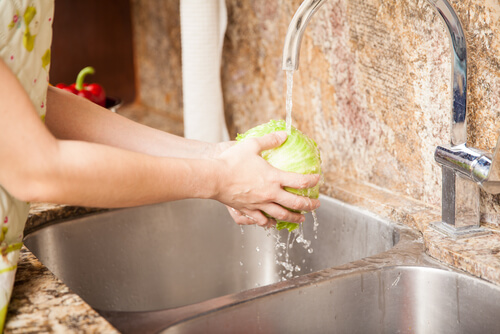How to Prevent Infections During Pregnancy?

When it comes to preventing infections during pregnancy, there’s no such thing as having too much information. When it comes to your health, you must keep in mind that it’s completely your responsibility. Therefore, it’s important to know how to take care of yourself properly.
During pregnancy, women are more prone to suffer from certain types of infections if proper measures aren’t taken. That’s why it’s so important for you to know how to prevent infections during pregnancy if you decide to have a baby.
As with many other topics related to health and well-being, having healthy lifestyle habits is essential. When it comes to pregnant women, extra care has to be taken.
11 ways to prevent infections during pregnancy
In order to prevent diseases that may be harmful both to you and your baby, it’s important to have good hygiene.
Good hygiene should be maintained personally and in the surrounding environment. It’s important to maintain a clean environment in order to guarantee comfort and safety.
Although most of these habits are simple and they have to do with common sense, we often overlook them because we believe that we’re being “overly” cautious.
For example, by overlooking the simple act of washing your hands after touching an animal, you may be giving the green light to germs which can have harmful consequences. Therefore, it’s important to keep the following aspects in mind:
- Maintain good personal hygiene. It all begins with the individual.
- Wash your hands thoroughly and regularly. This is one of the best ways to eliminate germs and prevent infections.
- Keep your medical history up to date especially when it comes to vaccines. Vaccines are applied according to certain criteria. Some vaccines are placed before the woman gets pregnant, others during pregnancy and some are even applied immediately after delivery.
- Applying the right vaccine at the right time can help prevent long-term health issues. This is true both for the mother and the baby.

- Applying the right vaccine at the right time can help prevent long-term health issues. This is true both for the mother and the baby.
- Thoroughly wash all food before consuming them. This way you’ll eliminate common bacteria that can affect the stomach.
- Avoid sources of infection. Although this seems like an obvious warning, you should try to avoid contact with people who have contagious diseases such as chicken pox or rubella. This is very important if you’ve never had these diseases. If you live near a field, make sure to protect yourself against ticks.
- Careful with insects. Avoid mosquitoes. It’s important to invest in repellents and you can take additional measures by buying a mosquito net.
- Use insect repellents that are approved by your doctor or lemon and eucalyptus oil. Avoid travelling to areas where infections such as Zika may pose a threat to you and your baby.
- Be aware of the diseases and viruses that are in your geographical location.
- If you eat meat, make sure it’s always well done. Although this may seem obvious, remember that raw meat can put your health at risk.
- Keep in mind that poorly cooked and processed meats may contain harmful bacteria for pregnant women.

- Ask your doctor about supplements such as iron, folic acid, and vitamins that are necessary to maintain your defenses in optimal conditions. This will reduce your risk of suffering from infections.
- Keep in mind that poorly cooked and processed meats may contain harmful bacteria for pregnant women.
- Be cautious with public pools. Public pools can increase your risk of suffering from a urinary tract infection. Try to avoid public toilets, and if you must use one, try to avoid touching the toilet seat.
- The same applies to any public space: be careful where you sit. There are many different factors that can be harmful. These factors range from pigeon waste, to dirty items in the street.
- If you’re going to be outdoors, don’t sit directly on the ground or on the dirt. Always carry a blanket or towel to sit on. The towel that you use should be washed after every use.
- Learn to delegate risky tasks
- If you have a cat and a litterbox, don’t touch or clean it. This should be done in order to prevent infections. Delegate the task of cleaning the litter box to someone else in the house. If there is no one to help you, use gloves while cleaning your cat’s litter and wash your hands after you’re done.
- Avoid contact with open wounds and other personal grooming items that may be contaminated with blood or other fluids that can be harmful to your health.
These recommendations can be applied to your daily life quite easily. If you adopt these tips during your pregnancy and even afterwards, they can provide you with great long-term health benefits.
Following these tips will also prevent you from going through annoying and unnecessary situations.
The most important thing is to remember not to fall short when it comes to taking precautions during your pregnancy. You’re responsible for your life and that of your baby. Therefore it’s very important for both of you to stay healthy.
When it comes to preventing infections during pregnancy, there’s no such thing as having too much information. When it comes to your health, you must keep in mind that it’s completely your responsibility. Therefore, it’s important to know how to take care of yourself properly.
During pregnancy, women are more prone to suffer from certain types of infections if proper measures aren’t taken. That’s why it’s so important for you to know how to prevent infections during pregnancy if you decide to have a baby.
As with many other topics related to health and well-being, having healthy lifestyle habits is essential. When it comes to pregnant women, extra care has to be taken.
11 ways to prevent infections during pregnancy
In order to prevent diseases that may be harmful both to you and your baby, it’s important to have good hygiene.
Good hygiene should be maintained personally and in the surrounding environment. It’s important to maintain a clean environment in order to guarantee comfort and safety.
Although most of these habits are simple and they have to do with common sense, we often overlook them because we believe that we’re being “overly” cautious.
For example, by overlooking the simple act of washing your hands after touching an animal, you may be giving the green light to germs which can have harmful consequences. Therefore, it’s important to keep the following aspects in mind:
- Maintain good personal hygiene. It all begins with the individual.
- Wash your hands thoroughly and regularly. This is one of the best ways to eliminate germs and prevent infections.
- Keep your medical history up to date especially when it comes to vaccines. Vaccines are applied according to certain criteria. Some vaccines are placed before the woman gets pregnant, others during pregnancy and some are even applied immediately after delivery.
- Applying the right vaccine at the right time can help prevent long-term health issues. This is true both for the mother and the baby.

- Applying the right vaccine at the right time can help prevent long-term health issues. This is true both for the mother and the baby.
- Thoroughly wash all food before consuming them. This way you’ll eliminate common bacteria that can affect the stomach.
- Avoid sources of infection. Although this seems like an obvious warning, you should try to avoid contact with people who have contagious diseases such as chicken pox or rubella. This is very important if you’ve never had these diseases. If you live near a field, make sure to protect yourself against ticks.
- Careful with insects. Avoid mosquitoes. It’s important to invest in repellents and you can take additional measures by buying a mosquito net.
- Use insect repellents that are approved by your doctor or lemon and eucalyptus oil. Avoid travelling to areas where infections such as Zika may pose a threat to you and your baby.
- Be aware of the diseases and viruses that are in your geographical location.
- If you eat meat, make sure it’s always well done. Although this may seem obvious, remember that raw meat can put your health at risk.
- Keep in mind that poorly cooked and processed meats may contain harmful bacteria for pregnant women.

- Ask your doctor about supplements such as iron, folic acid, and vitamins that are necessary to maintain your defenses in optimal conditions. This will reduce your risk of suffering from infections.
- Keep in mind that poorly cooked and processed meats may contain harmful bacteria for pregnant women.
- Be cautious with public pools. Public pools can increase your risk of suffering from a urinary tract infection. Try to avoid public toilets, and if you must use one, try to avoid touching the toilet seat.
- The same applies to any public space: be careful where you sit. There are many different factors that can be harmful. These factors range from pigeon waste, to dirty items in the street.
- If you’re going to be outdoors, don’t sit directly on the ground or on the dirt. Always carry a blanket or towel to sit on. The towel that you use should be washed after every use.
- Learn to delegate risky tasks
- If you have a cat and a litterbox, don’t touch or clean it. This should be done in order to prevent infections. Delegate the task of cleaning the litter box to someone else in the house. If there is no one to help you, use gloves while cleaning your cat’s litter and wash your hands after you’re done.
- Avoid contact with open wounds and other personal grooming items that may be contaminated with blood or other fluids that can be harmful to your health.
These recommendations can be applied to your daily life quite easily. If you adopt these tips during your pregnancy and even afterwards, they can provide you with great long-term health benefits.
Following these tips will also prevent you from going through annoying and unnecessary situations.
The most important thing is to remember not to fall short when it comes to taking precautions during your pregnancy. You’re responsible for your life and that of your baby. Therefore it’s very important for both of you to stay healthy.
This text is provided for informational purposes only and does not replace consultation with a professional. If in doubt, consult your specialist.








